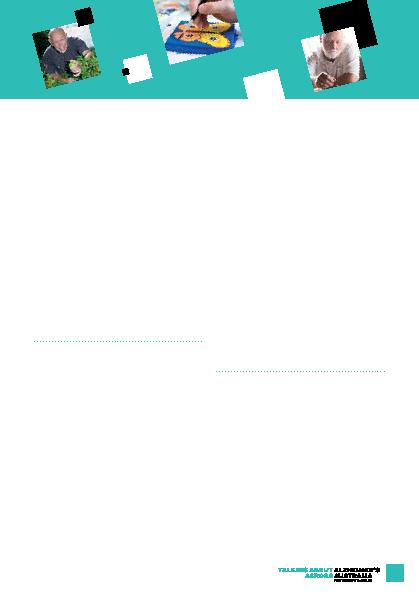
an improvement in mood. Rhythm can be
fun, enables communication without words,
empowers and improves the wellbeing of the
person with dementia and the people who are
significant in their lives.
(DRUMBEAT), originally designed to engage
young people at risk, will be modified for the
project. The ten week program will consist
of one hour drumming sessions and the
exploration of relationship themes.
encouraged to think outside the square and
understand the benefit of learning a `new'
language of rhythm. This program enhances
quality of life for people living with dementia
and the people who are sharing the journey
with them. People will learn to laugh, love and
live again.
Alzheimer's Australia NT, Alice Springs
experiences arranging a culturally appropriate
and accessible brain health information session
for residents of Hermannsburg, NT.
target audience you need to connect with is
a common problem when working in remote
and rural Australia. Using the existing Mind
Your Mind program, I created straight-forward
presentation cards using locally recognisable
photographs and illustrations. I worked with an
Aboriginal Liaison Officer from NT Government
with activities and examples to back up the
information, and liaised with the Aged Care
Coordinator on community for the practicalities
of venue and transport. A healthy lunch,
games and music were provided to reflect
the brain health message. What resulted was
an inspiring afternoon with a group of senior
Hermannsburg residents and their families,
some of whom were living with dementia.
of interagency collaboration and flexibility in
approach to remote education delivery and the
recognition and understanding that there is
no "one size fits all" for remote communities
or their residents when it comes to resource
design.
health education and dementia information
in Aboriginal communities. At present, work
is starting in the NT to create a nationally
available brain health resource that is suitable
for use in these settings.
of tablet technology in their practice. This
presentation will demonstrate the use of ipads
in music therapy practice in both high and low
aged care settings. The positive and negatives
of the use of ipads will be explored through
case studies. Discussions will focus on using
ipads as an extension of a music program
conducted by leisure and lifestyle staff with
the supervision of a registered music therapist.